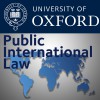Humanity, Inclusive Positivism and the Law of Armed Conflict
Humanitarian personnel from time to time find themselves transporting desperate civilian residents forced out of besieged areas into long-term or even permanent displacement, although such removal is absolutely forbidden under the law of armed conflict (LOAC). Killing enemy combatants using lethal autonomous weapons may feel deeply offensive to humanity, yet it arguably remains in compliance with today’s LOAC. When faced with dilemmas such as these, what is an ethically sensitive and law-abiding actor to do? Can the law itself resolve them?
In his new book, Military Necessity: The Art, Morality and Law of War, Nobuo Hayashi develops two hypotheses regarding how concerns for humanity may override LOAC rules. In one, even if LOAC’s black-letter rules prohibit particular action, its compliance with what humanity demands may restore its lawfulness. Hayashi calls this hypothesis “Humantätsgebot geht vor kriegsmanier”, or “Humantätsgebot” for short. In the other hypothesis, doing what humanity condemns is sufficient to impair its conformity with LOAC’s black-letter rules and to render it unlawful as a result. He calls this latter hypothesis “counter-Humantätsgebot”.
An example of the first hypothesis can be seen in Article 118 of Geneva Convention III (1949) that unqualifiedly obligates states to release and repatriate all prisoners of war (POWs) in their custody without delay. And yet, already during the Korean War, states declined to repatriate POWs against their own will. Towards the end phase of the Falkland-Malvinas conflict, the British kept their Argentine POWs in detention aboard naval vessels at sea on urgent humanitarian grounds, despite Article 22 of Geneva Convention III according to which POWs “may be interned only in premises located on land”. If we were to justify such behaviour, would we not have any choice but to do so by accepting Humantätsgebot?
An example of the counter-Humanitätsgebot hypothesis is how in 1991, Iraqi forces retreating en masse from Kuwait via desert highways were intercepted by Coalition forces and decimated under relentless artillery and machinegun fire. The so-called “capture rather than kill” debate highlights LOAC’s ambiguity where one has the option to capture, wound or kill one’s enemy. It is asserted with a growing frequency that killing rather than capturing enemy soldiers should be deemed a breach of LOAC where they were susceptible to both modes of disablement. A hint of counter-Humantätsgebot is inescapable here, in so far as it is arguable that today’s LOAC does not obligate the belligerent to employ the least injurious mode of disablement available.
Hayashi will test the viability of these two hypotheses by re-imagining LOAC as a system of inclusive legal positivism. In one version of inclusive positivism, a legal system’s rule of recognition requires a would-be norm to be compatible with public morals (“necessity thesis”). To the extent LOAC’s rule of recognition espouses the necessity thesis, we can say that Humanitätsgebot is true. In another version of inclusive positivism, a rule of recognition validates public morals as law, whatever existing legal provisions have to say on the issue at hand (“sufficiency thesis”). Whether counter-Humanitätsgebot is true depends on the extent to which LOAC’s rule of recognition exhibits the sufficiency thesis.
Nobuo Hayashi is an Associate Senior Lecturer at the Centre for International and Operational Law, Swedish Defence University. He also holds visiting professorships at the UN-mandated University for Peace (San José, Costa Rica) and the UN Interregional Crime and Justice Research Institute (Turin, Italy). Hayashi specialises in international humanitarian law, international criminal law, jus ad bellum and international weapons law. He has twenty years of experience performing advanced research, providing expert advice, teaching postgraduate students and training senior professionals in these areas. Hayashi’s work has been cited in international war crimes trials and diplomatic negotiations. His latest monograph, Military Necessity: The Art, Morality and Law of War, was published by Cambridge University Press in 2020.
Major positions held: Senior Legal Advisor, International Law and Policy Institute (Oslo, Norway); Visiting Professor, International University of Japan; Researcher, Peace Research Institute Oslo; and Legal officer, Office of the Prosecutor, International Criminal Tribunal for the Former Yugoslavia. Degrees earned: Ph.D. (Leiden), LL.M. (Cantab.), DÉS (Graduate Institute), BSFS (Georgetown).




